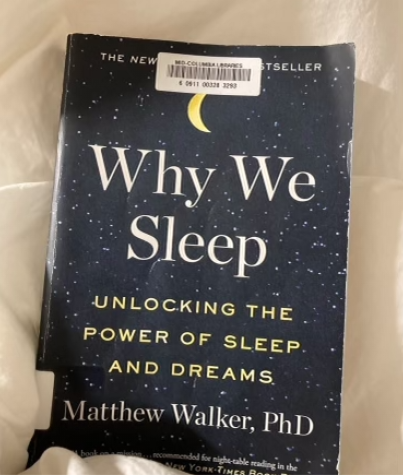Sleep we lack
Exploring society’s diminishing value of sleep & the dilemma of being ill-rested through Matthew Walker’s “Why We Sleep”
January 21, 2022

Just hit snooze one more time…drink one more cup of coffee…close your eyes for only a minute…
It is no secret that a continuous lack of sleep is considered to be of great detriment to one’s health. Such an issue is often equated with increased health problems, depression, anxiety, a shortened life span, lower memory and various other consequences.
Sleep is an integral part of the human lifestyle. Yet, by paying little attention to getting sufficient rest at night, people neglect what is perhaps one of the most fundamental human biological drives.
“Sadly, human beings are in fact the only species that will deliberately deprive themselves of sleep without legitimate gain,” wrote Matthew Walker, author, science researcher and professor of neuroscience and psychology, in his book “Why We Sleep.”
As college students who are constantly caught up in classes, schoolwork, social life and other activities, it can be easy to detract and redistribute minutes and hours from a sleep schedule. Getting a suitable amount of rest is not always prioritized. Through exploring the book, “Why We Sleep” by Matthew Walker, one can gain further insight into the importance of getting a good night’s rest, and why such a basic need is so often disregarded.
Throughout his book, Walker focuses mainly on descriptions of the systems and processes relating to sleep, as well as taking his readers through detailed explanations of the various factors that inhibit or help facilitate a good night’s rest. The topic that is most stressed, however, is the significant role that being well-rested plays in the lives of people.
Several of Walker’s biggest reasons for getting sufficient sleep include better physical and mental performance, increased alertness, improved memory and increased creativity and happiness. All of these qualities are essential for students who are required to intake and process a variety of information from their classes, take part in extracurricular activities and interact with peers and co-workers.
Regarding quality and sufficiency of sleep, Walker points out several substances to be aware of. Arguably the most popular and socially accepted substance, caffeine, has long been known to play a role in inhibiting sleep. This is due to its potency and long half-life.
Nicotine shows similar negative effects, as it is disruptive to sleep quality. Melatonin pills are also mentioned as being a partial placebo and suppressing feelings of alertness the morning after. And despite the popular belief that alcohol aids the process of sleeping, behaves more as a sedative, which puts the brain in a sort of false and unnatural state of restfulness.
A topic that comes up continually throughout the book is that of REM (rapid eye movement) sleep. Walker writes that REM sleep is the only point when your brain is completely free of molecules that trigger anxiety.
REM sleep-dreaming is also described by Walker as a therapeutic form of sleep, as it helps to process and partially eliminate any painful events or memories. As students, the cycle of REM is often disrupted due to waking up early for class after having gone to sleep late. Thus, levels of stress and anxiety rise.
Throughout “Why We Sleep,” Walker’s point remains that as a society, it is essential to recognize why lack of sleep is and has continued to be an issue. Not only must there be access to a proper understanding of the problem, but there also need to be structured models developed in order for change to happen and correction to be instilled.
“Society’s apathy toward sleep has, in part, been caused by the historic failure of science to explain why we need it,” wrote Walker.
























































































